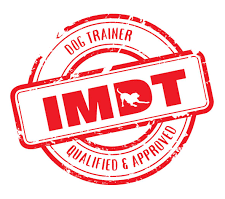Siberian Husky Residential Training
Ranked as the UK’s eighteenth most popular dog breed, the Siberian Husky is renowned for its high energy, keen intelligence, and strong instinctual behaviours. They particularly loved because of their striking wolf-like appearance, thick double-layered fur coat, staggering blue and at times even different-coloured eyes.
This stunning breed, characterised by a profound independent streak and a natural ability to run, demands specialised training tailored to its unique traits. Understanding and harnessing these attributes through expert guidance can turn the spirited Siberian Husky into a well-adjusted, well-behaved pet.
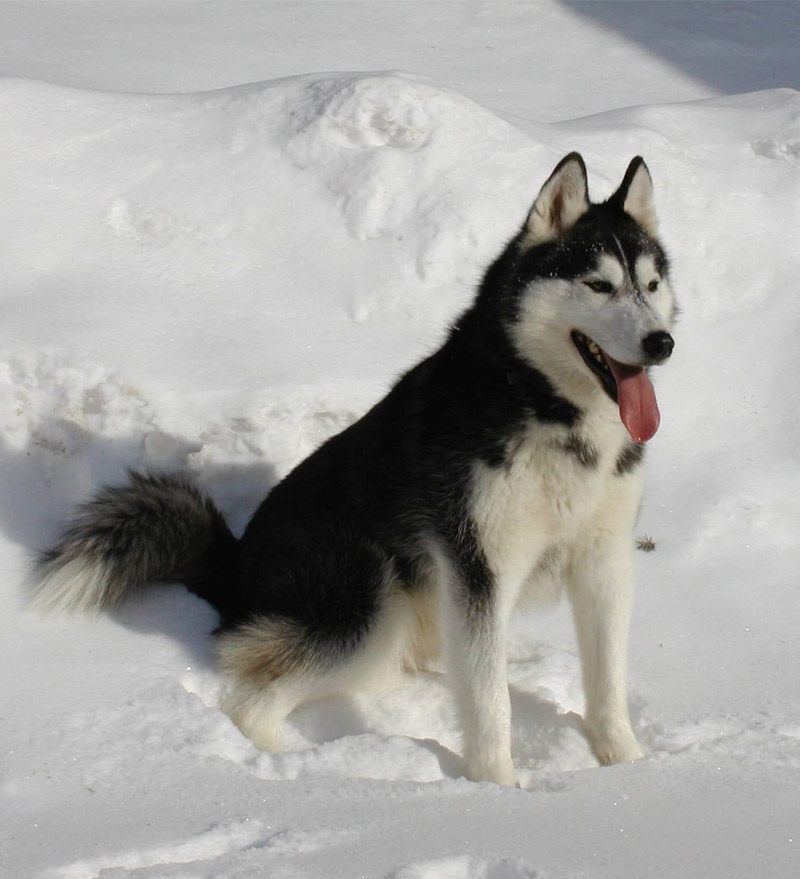
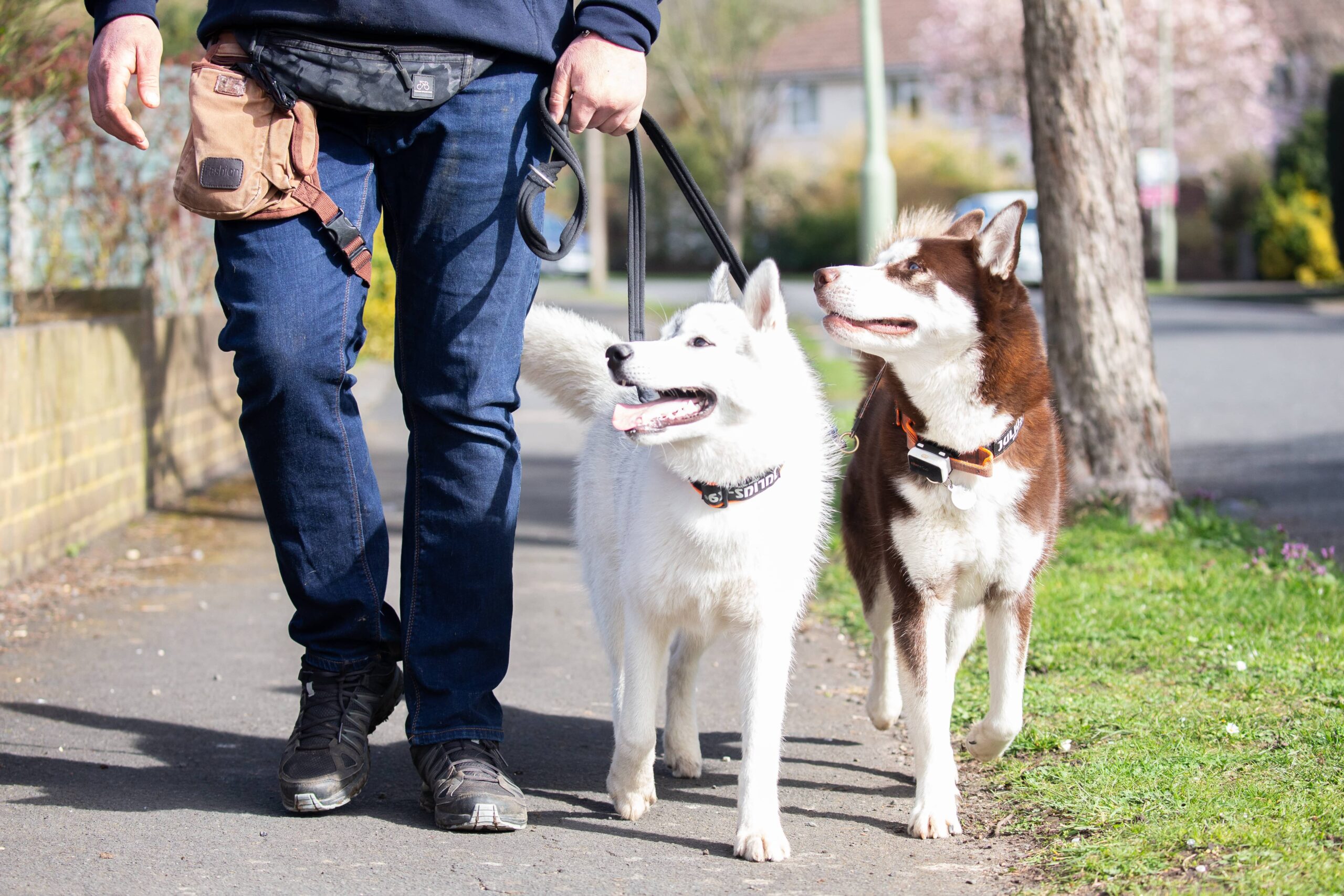
Your Husky’s Training Needs
Identifying whether your furry friend might benefit from professional training is the first step to getting them to fit in with your home and family. Originally bred by the Chukchi people in Siberia over 3,000 years ago, the Huskies were designed to pull sledges across long distances on minimal food reserves. Their unique metabolism allows them to endure prolonged periods of physical activity. This unique quality makes them excellent companions for outdoor activities like hiking or running but also means that they present a unique set of challenges that can test even the most patient of owners. Poor recall, a drive to explore, and seemingly boundless energy levels are just the tip of the iceberg.
If your Husky often ignores commands, consistently desires to roam while ignoring your boundaries, or displays overexcitement that you find difficult to manage, it might be time to consider professional help. These behaviours, while challenging, are signs that your Husky is crying out for structured guidance to channel its vibrant energy and curiosity in positive directions. Noticing these signs and directing them properly can transform potential frustrations into rewarding experiences for you and your adventurous companion.
Your Content Goes Here
Why Choose Royvon to Train Your Siberian Husky?
Our track record with high-energy and intelligent breeds like the Siberian Husky speaks volumes. At Royvon, we understand that a one-size-fits-all approach is not the right approach to taming the Husky’s unique character. That’s why our residential training programmes are tailored, focusing on recall and socialisation to meet the distinctive needs of these spirited dogs.
Over the decades, we have crafted a structured, engaging learning environment that aligns perfectly with a Husky’s remarkable endurance and sharp intelligence. Our goal is to make training a thrilling adventure for your Husky, making sure that each session harnesses their energy and curious nature in positive, rewarding ways.
With Royvon, training becomes more than just learning commands – it’s about unlocking the joy and potential of your dog, making every day together better than the last.
Our Siberian Husky Training Approach
Despite their wolf-like experience, Huskies are very friendly and have outgoing personalities, which we aim to develop with our personalised training plans. Our training usually starts with an initial behavioural assessment. This step allows us to pinpoint the specific quirks and challenges your furry friend might present. We then tailor a suite of training techniques designed to match their profile.
Key to our strategy is positive reinforcement, ensuring that good behaviour is always celebrated with heaps of praise and the occasional tasty treat. We maintain consistency in commands to avoid confusion and improve understanding, which is crucial for a breed as bright as the Husky. Mental stimulation activities are also a staple in our regimen, keeping those clever Husky brains engaged and out of mischief.
Moreover, we place a strong emphasis on physical exercise. Activities are designed not only to tire out those energetic legs but also to channel your Husky in a positive direction. After all, a tired Husky is a happy Husky – and much more likely to be well-behaved, too!
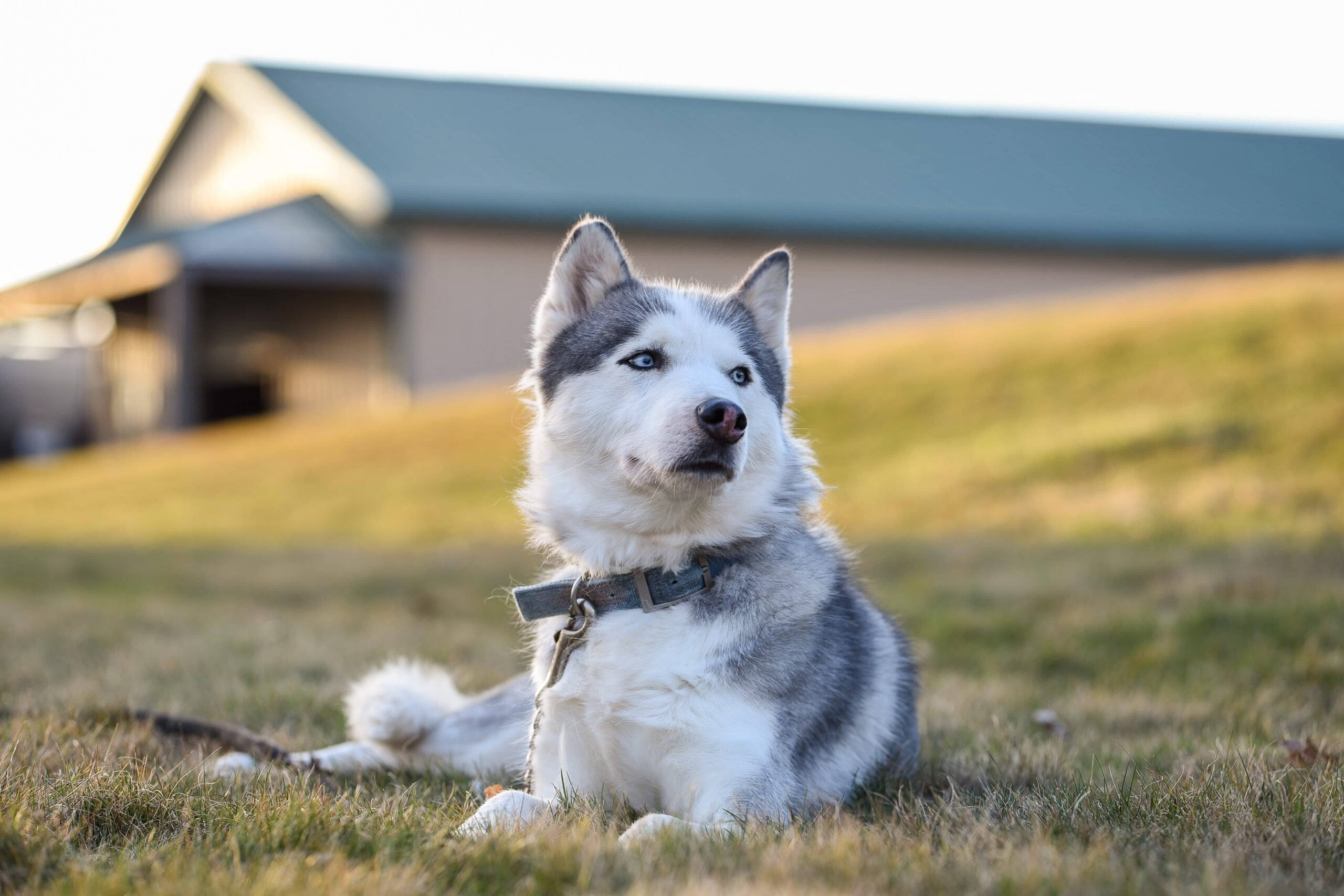
What To Expect From Our Training?
Our bespoke residential training program is designed to meet the unique needs of this energetic breed. Our training programs are available in the specially designed settings of our Esher, Merthyr Tydfil, and Bridgend centres. Each location provides an ideal backdrop for intensive training, where your Husky can thrive under the guidance of professional trainers. Our spacious training facilities have enough outdoor space to meet the unique needs of your Husky.
Our residential training is chock-full of benefits. It establishes a daily routine, instilling discipline and consistency – key for those clever Huskies. The structured environment also makes sure they receive consistent, professional training throughout their stay, helping to reinforce desirable behaviours effectively.
Why Should You Train Your Husky
Training your Siberian Husky at Royvon brings many benefits that will make both your lives more enjoyable! Here’s what to expect:
Improved obedience
You’ll notice a clear enhancement in your Husky’s behaviour with fewer unwanted escapades.
Improved safety and trust
Thanks to reliable recall training, your Husky will return when called, reducing risks during outings.
A strengthened bond
You’ll gain a deeper connection through improved communication and understanding, fostering mutual respect and affection.
Better socialisation
Your Husky will interact more amicably with other dogs and people, making every interaction more enjoyable and less stressful.
Training Husky Puppies
Jumping into puppy training as early as possible isn’t just beneficial – it’s essential! Starting while they are young helps shape their behaviour right from the early development stage, preventing future issues. Consider it as setting the stage for a lifetime of good manners and joyful companionship.
At Royvon, our puppy-specific training methods are designed to build a strong foundation for your Husky. Our methods focus on gentle, fun, and practical techniques that encourage your pup to learn and grow confidently. By teaching basic commands, socialisation skills, and proper leash manners early on, we help your Husky puppy develop into a well-adjusted adult. Let’s get those paws on the right path from the get-go!
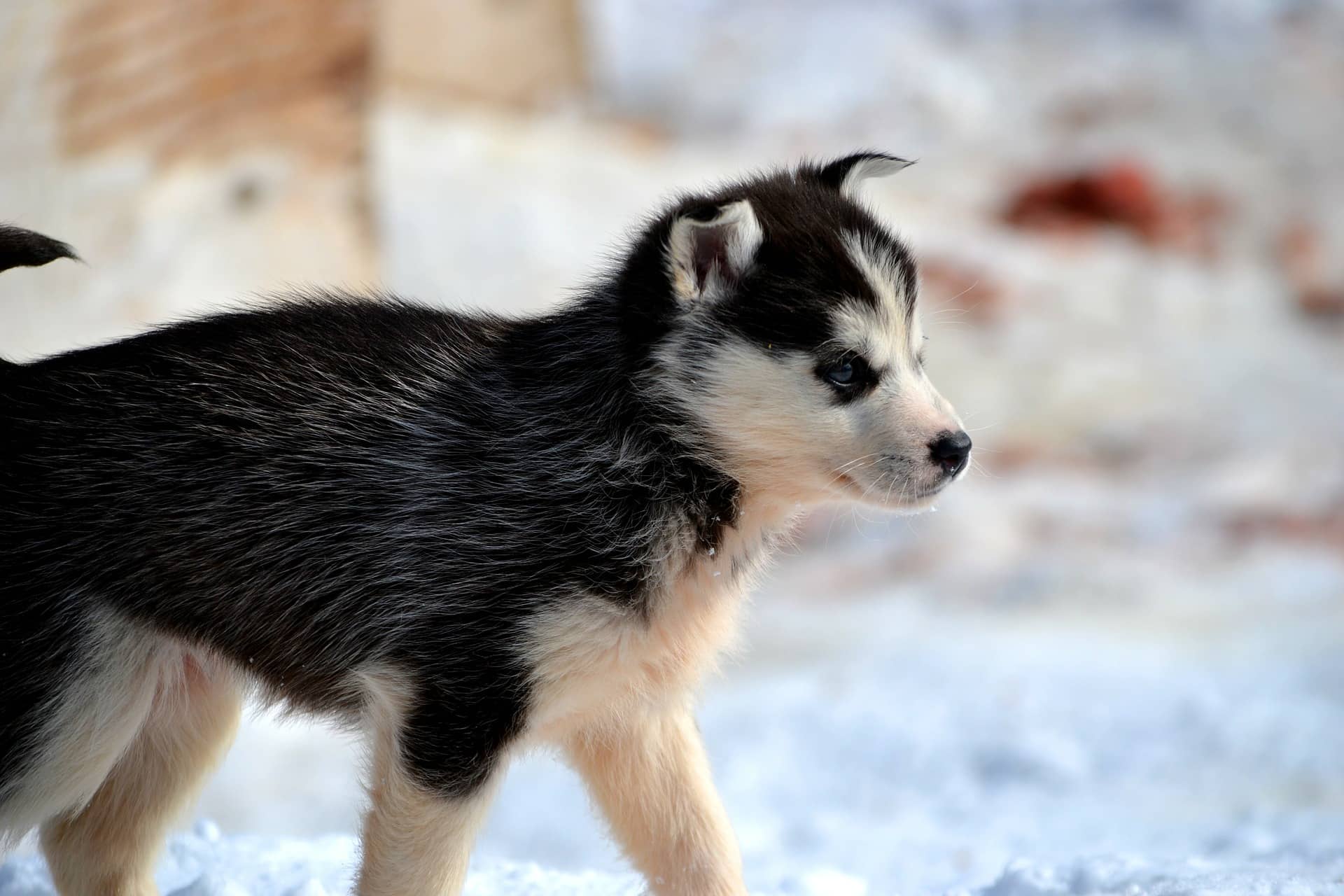
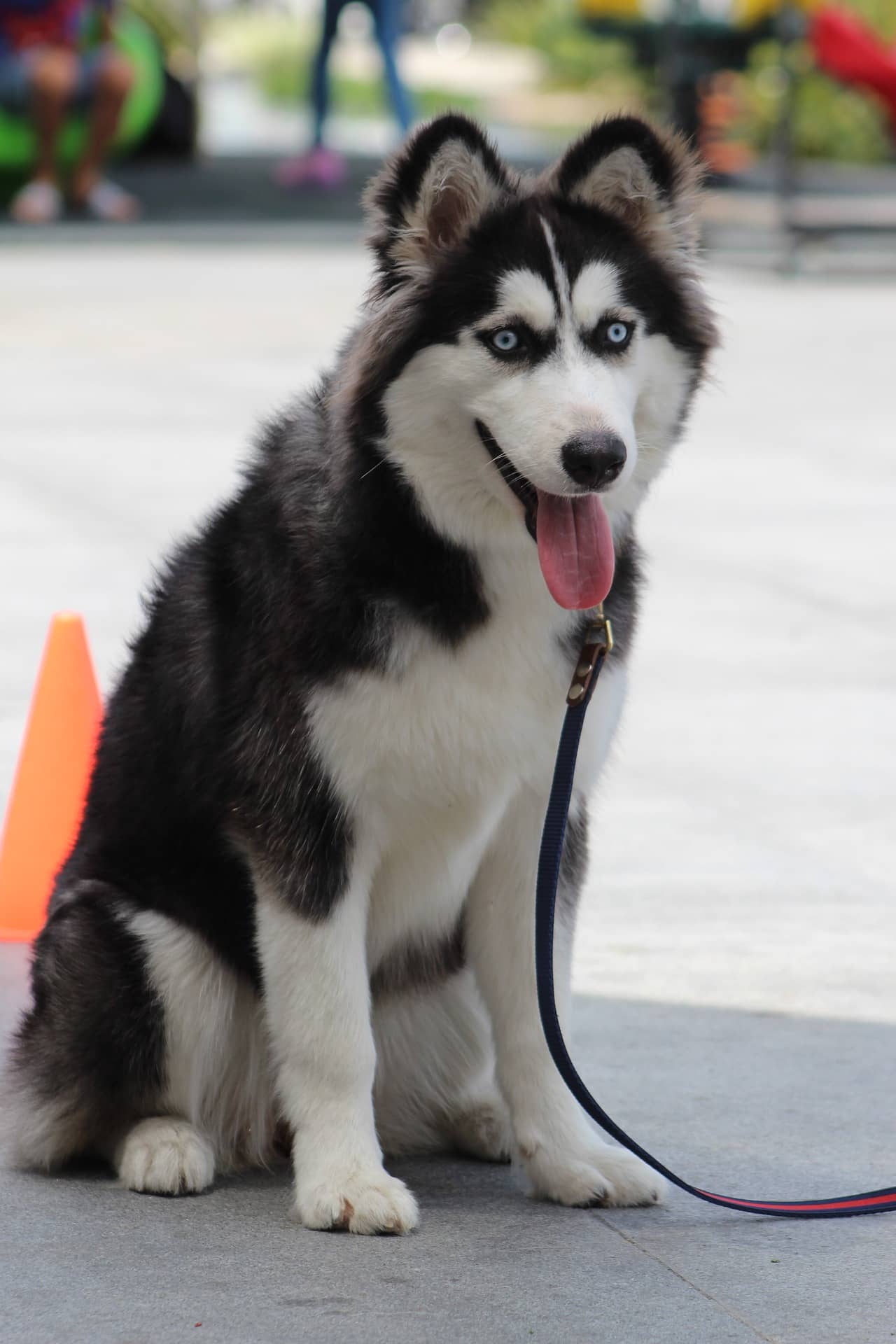
Our 5-Star Dog Boarding Facilities
Our residential training also includes a stay in our exclusive 5-star dog boarding facilities – a natural retreat for your Husky! This isn’t just any dog boarding experience – it’s a tailored environment that meets the unique needs and preferences of Siberian Huskies.
- Each Husky guest enjoys comfortable, luxurious, and spacious living quarters, with plenty of room to stretch, play, and relax after a stimulating training session. Your pet’s comfort is our top priority.
- Understanding the high energy levels of Huskies, we provide bespoke exercise programs that include extended runs, agility courses, and plenty of outdoor play to satisfy their adventurous spirits.
- Our boarding staff are dog lovers first and foremost, providing round-the-clock care and attention, so that every Husky feels loved, secure, and part of the family during their stay.
- We work with local vets in case of emergencies, such as injuries or unexpected illnesses.
- We feed your Husky regularly, following a schedule that meets the dietary needs of this active breed, supporting their health and training progress.
Our dedication provides an experience that ensures your Husky’s training journey is as enjoyable as it is effective, making Royvon the perfect choice.
Train Your Husky with Royvon
Ready to give your Siberian Husky the royal treatment while honing their innate characteristics? Book your dog into Royvon’s residential training program today!
We’ll start with a personalised consultation to discuss your Husky’s training needs. Let’s tailor a program that makes sure your Husky behaves impeccably and enjoys every moment of their learning journey.
Give us a howl, and let’s start this exciting adventure together!
The staff were brilliant ( Millie especially)
My shepherd ( Easy ) was looked after so well on his “ confidence “ stay .
I was updated regularly.
We will be booking another stay soon .
A very professional, efficient ,
knowledgeable & friendly set up .
I highly recommend a visit .
Thanks very much everyone at Royvon
Nick & Easy 🐾
It has been very difficult for us to leave Riley in anybody else’s care because he requires experience and a controlled environment and we were blown away by how intuitively and confidently the team at Royvon took care of him and put our minds at ease. Millie who checked Riley out was fantastic too and had spent extra time with him that morning, and everybody we met on site was so responsive, kind and professional. It is life changing to know there is a place we can trust with a tricky but beloved dog, and we are looking forward to Riley building strong relationships with the team there. Thank you Tilly, Millie and all at Royvon!
Sisu absolutely loves it at Royvon and gets excited every time we pull into the car park!
From the moment we drop her off, we know she’s in great hands. The staff are professional, caring and clearly passionate about what they do.
Sisu always comes home happy, healthy and tired after enjoying days packed with play, training and love from the team :).
It gives us total peace of mind knowing she’s getting great care and we never hesitate to book her into Royvon when we’re going away.
We highly recommend Royvon!
I can now go on holiday knowing that my dog will be having a great time too.
Alfie and familyxx
Both Leo and Pippin had a great time at Royvon, staff all very pleasant and clearly love working with the dogs. The videos of the dogs out and about shows how happy they are whilst on their holidays. Wouldn’t hesitate to use Royvon again.
Over the last few months, Mimi has done a brilliant job of training both Gus and me and I cannot recommend her and Royvon highly enough. Gus responded to her immediately and tried so hard to do everything that she asked of him. Her patience and clear understanding of what Gus and I were struggling with was reassuring. The notes sent after each training session were so helpful and ensured that I was consistent with training between sessions. At 12 months old, Gus will now walk on a loose lead, check in with me before going to another dog and sit quietly as other dogs walk by. We have both loved every 1:1 session with Mimi and look forward to doing more training with her.
We dropped Maysie off for her initial assessment with Romeo all muzzled up to be safe. We spent approx an hour and a half with him, walked through his training routes including the town, playing fields and railway station. We watched some of the training techniques he would be using and then we left her there looking very sorry for herself. Within an hour of us leaving Romeo sent a video through of them both and Maysie was eating treats out of his hand - muzzle free.....we were absolutely gobsmacked! We visited again the 3rd day for a training seasion and then left her there for her residential. We received daily updates, photos and videos from the Royvon Team showing how she was improving and also enjoying additional playtime and socialisation with some of the other dogs.
When we returned to Royvon we had a 3 hour handover session with Romeo walking again through his training route. We were able to see how much Maysie had improved since our first visit and tried some of the techniques ourselves with guidance from Romeo. We then a further couple of hours with him again the following day before returning home with Maysie.
We have definitely seen positive improvements in her behaviour since she has been in training with Romeo and cared for by the Royvon team. She seemed to have taken really well to everybody there and had been giving them all her special Maysie cuddles by the time she left.
Over our first week at home we have been continuing to incorporate the training we have learned into our walks. It has been a bit of a challenging week transitioning back to home life but we are committed to putting the work in and Romeo has been keeping in touch with his invaluable guidance and support.
We have a follow up session booked in at the beginning of July and are confident that with the tools, guidance and additional support from Romeo and that Maysie will continue to improve and that these new behaviors she is learning will just become natural for her.
Romeo is undeniably passionate about his dogs in his care. He genuinely wants to achieve a positive outcome for both dogs and their owners. His professionalism, knowledge, understanding and empathy shown towards Maysie and his ongoing follow up support for ourselves has been nothing short of amazing. We can't thank Romeo and the Royvon team enough and look forward to returning back to visit in July.
Especially Tilly, Millie and Ella who looked after my German Shepherd Ralphy. It was so clear to see how loving, caring and attentive you all were with him … it truly made a difference.
When I got home, he was relaxed, happy and clearly well looked after. It’s a huge comfort knowing he’s in such good hands.
Thank you again for all the love you gave him.
I love getting the daily photo updates and seeing him playing with his friends. It’s such a relief knowing he’s in a safe and stimulating environment while I’m at work.
Highly recommend to any dog parent looking for peace of mind and a tired, happy dog at the end of the day!
Olive has just completed her three weeks intense training and it’s like we’ve brought home a different dog. Not only is she calmer in the house, but we can now walk her without her being petrified of every noise and person that comes near her. She’s even just walked the school run with me.
Romeo and the team at Royvon have been a godsend to us, and we can’t wait to see how much further they can help Olive grow into a much loved happy and confident family pet.
I found royvon by sheer chance and it’s changing our lives. The staff were from the very first contact to his stays now so comforting and reassuring, seeing my obvious nerves about Hunters behaviour Chloe especially gave me all the time in the world, listening to my ever ending knowledge dump about hunter, why’s he’s like this, triggers, how once he’s settled he’s lovely and since the day of his confidence stay i’ve not looked back. dropping him off to strangers which is absolutely my worst fear with a reactive dog and they set such an energy he’s excited to leave me and settles in so happily. I get regular updates of how he is, what he’s doing, anything they want to tell me and it is just the best thing to open my phone to. i get photos and videos of walks and play, updates on his eating.
from someone who suffers constantly stress of a dog with behavioural issues, this is the absolute best care i’ve had for him hands down. i can’t thank the Esher team enough, especially his main handler chloe for the time and patience they give us
When we went back for our top up session, Orphy was super excited to drive through the gates and could not wait to get out of the car! We did about an hour with Charlie, going over techniques to keep Orphy interested and help us with her ongoing training while she’s at home. The refresher appointments are a nice touch and definitely worthwhile!
We absolutely recommend Royvon and are so grateful to have found them!
We want to say a huge thank you to Romeo, Kelsey, and the entire care team at Royvon. You took amazing care of Buddy, giving daily updates of his training sessions and group plays, which really helped to put our minds at ease. Buddy has built a lovely bond with Romeo and the team, and I’m sure he will look forward to any day plays there in the future.
Jasper was extremely reactive to just about everything, including people, dogs and traffic.
Through a lot of hard work, we have made so much progress with Romeo and Kelsey. They have really gone above and beyond to try and make him more manageable, and what a difference it’s made.
He is still reactive, mainly to dogs, but he can do so much more now. As with any German Shepherd puppy, we still have lots of work to do, but we believe we now have the tools to succeed thanks to Royvon.
We will still be coming back as Jasper has built a stone bond with both of his trainers, but we thoroughly recommend Royvon for anyone struggling with a difficult dog, or just a dog that needs training!
The choice of services available makes boarding here a seamless home away from home experience for our Labrador, Dune. The staff are friendly, welcoming and professional and our dog is always very well looked after. The daily updates and photos alongside Royvon's insta posts give us the confidence to leave our furry family member in their capable hands.




